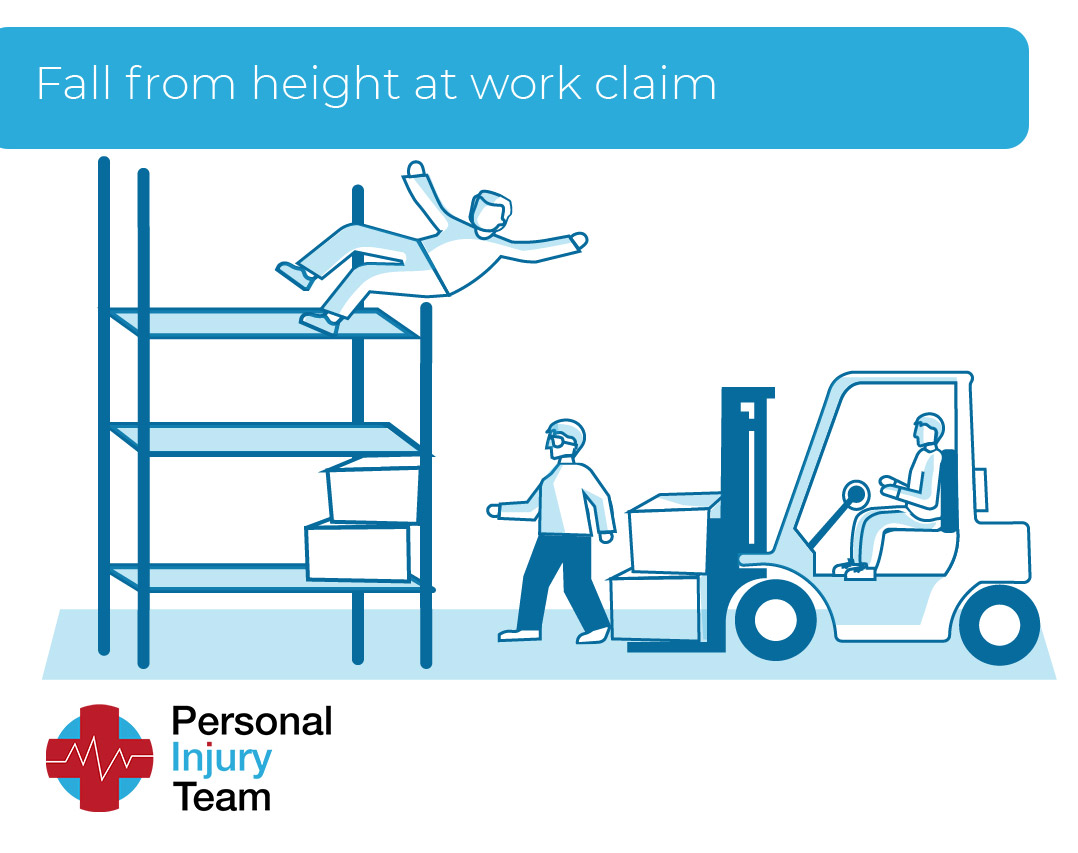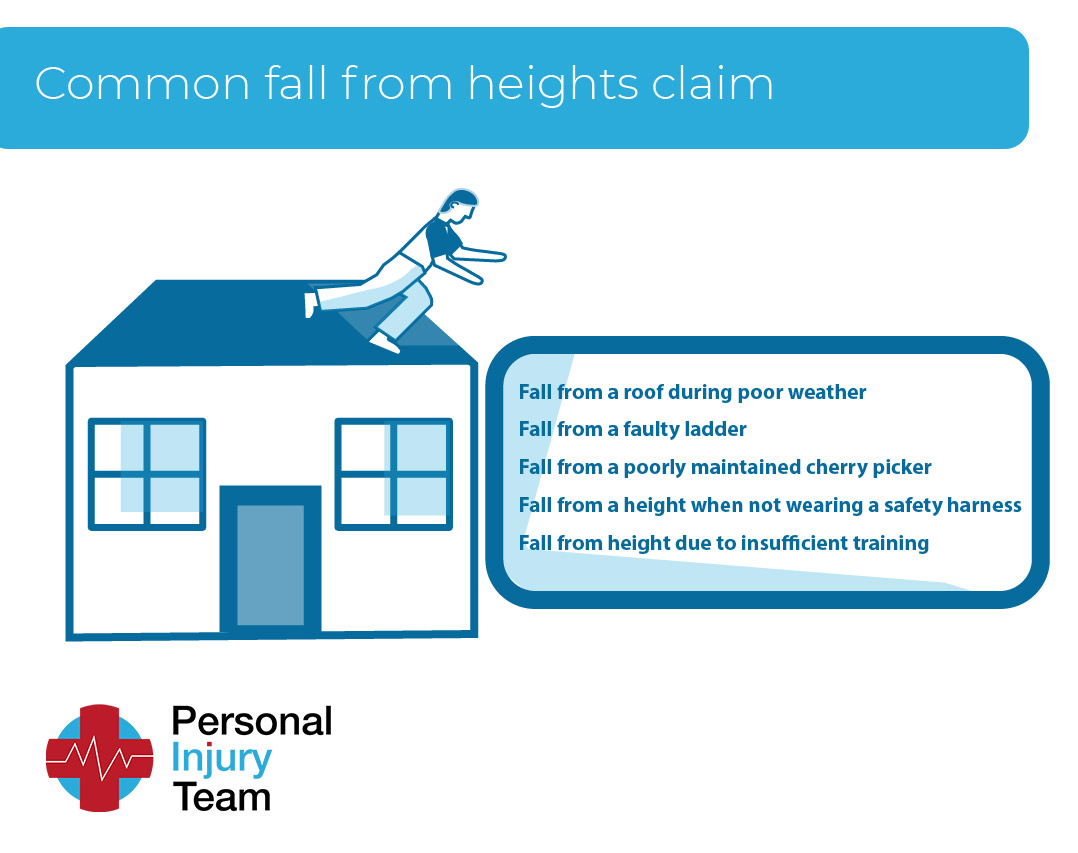If you have been injured due to a fall at work, and it was not your fault, you may be entitled to make a claim workplace compensation.
If you suffer an injury due to a fall from a height at work caused at least partly by someone else’s negligence, you may well be entitled to claim compensation. You claim for the injury caused by the fall and the effects of it on your life.
Your personal injury solicitor seeks to recover damages through a claims process. If you or a loved one have been injured and your life impacted by an accident that was someone else’s fault, a claim for compensation seeks financial redress for the injuries and financial losses.
If you have been injured in an accident and it was not your fault, The Personal Injury Team No Win No Fee solicitors can file your compensation claim for the money you deserve.

Table of Content
What is a fall from a height at work claim?
A fall from a height at work claim is the legal process to seek compensation for your injuries and the effects on your life. If the fall causes you or a loved one injury, and it is not your fault, you might be able to claim compensation.
A fall from a height at work could be when working on a roof, cleaning windows or stocking warehouse shelves. You should be fully trained and supplied with the correct equipment for all work-at-height jobs.
Your employer should not ask you to work at height if you are not trained for the work involved.
You may be off work for some time recovering from the fall from a height injury. You could need hospital care and have large medical bills to pay after any fall from a height at work. The claim you make seeks compensation to cover the costs of the injury and the effects of it on your life.
A No Win No Fee personal injury solicitor can review your case and advise if you have a valid fall from a height at work injury compensation claim.
Common claims for falls from a height at work
Common claims for falls from a height at work are a broken leg when falling from scaffolding, an injured elbow falling from a ladder, and a concussion in falling from a cherry picker.
If you suffer an injury in a fall from a height at work, you might have a claim for compensation.
Common claims for falls from a height at work are:

Fall from a roof during poor weather
A fall from a roof during poor weather can happen if you are asked to work when the conditions are not suitable for being at a height. High winds, heavy rain and icy weather, can all make the roof an unsafe place to work.
It may be difficult to refuse if your employer asks you to work on the roof. Your employer owes you a duty of care, though, and should not ask you to work at a height in adverse weather conditions.
You might have a claim for compensation if injured in a fall from a roof during poor weather.
Fall from a faulty ladder
A fall from a faulty ladder may happen if your employer does not properly maintain their equipment. A ladder used for working at a height should be safe for employees and not be cracked or have faulty rungs.
A fall from a ladder can result in broken limbs, twisted ankles and even death in some cases.
A possible claim for compensation may get you the money you deserve for the injuries.
Fall from a poorly maintained cherry picker
A fall from a poorly maintained cherry picker can do serious injury, such as damage to the spine, broken legs and could be fatal. The employer has a duty of care to maintain the cherry picker and keep it in good working order.
A breach of their duty of care to you could result in a severe injury in an accident which could have been prevented.
You may have a claim for compensation for an injury due to that breach of duty of care.
Fall from a height when not wearing a safety harness
A fall from a height when not wearing a safety harness may do serious injury from only a few feet off the ground. The employer should supply a working safety harness and ensure you wear it when working at a height.
Failing to supply a safety harness breaches an employer’s duty of care to you. Working at height can be dangerous, and Health and Safety procedures should always be followed.
You may have a fall from a height at work claim, even if you did not wear an available safety harness.
Fall from a height due to insufficient training
A fall from a height due to insufficient training can happen when an employer is negligent in ensuring all employees are fully trained for every task.
Your employer should provide adequate training for when you are working at height. They should provide safety information and ensure you are trained for working at height.
You could have a claim for compensation if injured when working at height due to insufficient training.
Compensation for a fall from a height at work
Compensation amounts are difficult to estimate without all the details. Bellow are a range of estimates. For a more accurate quote, speak to the Personal Injury Team.
Who is responsible for a fall from a height at work claim?
An employer could be responsible for a fall from a height at work claim. Your employer is responsible for ensuring staff are sufficiently trained in the workplace, especially when working at height.
By law, they are responsible for providing adequate training for all situations around the office, warehouse, and factory.
You may be partially responsible for a fall from a height at work, but you may still be able to claim compensation if you show you are not wholly responsible for the fall.
The employer is responsible for updating training and for ensuring staff are up-to-date with the proper training for working at height. If you change jobs within a company, your employer should ensure you receive the correct training for the new position.
If your employer has not provided adequate training or suitable equipment and you are injured in a fall from a height that was not your fault, you might have a claim for compensation.
What should an employer do to prevent falls from height at work?
Your employer should follow Health and Safety guidelines to prevent falls from height at work. The employer has a duty of care to all employees to ensure you are fully trained for the work and only use the correct equipment and gear.
To prevent falls from height at work, an employer should:
If an employer fails to provide adequate training and maintained equipment, you might have a claim for compensation if injured in a fall from a height at work.
Find out how much you can claim for today
If you have been the victim of a fall from a height at work and it was not your fault, you may be entitled to workplace injury compensation.
Speak with a no win no fee personal injury solicitor today.
Take a FREE online claim assessment and find out how much you can claim in compensation.
Find out why the Personal Injury Team are the UKs favorite personal injury solicitors.

